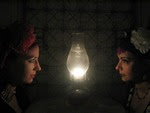Yesterday one of my friends posted a Kafka quote that made me cheer: "The only thing worse than suffering is the refusal to suffer." My response was that I am pro suffering and anti-comfort, because it's the American addiction to comfort that makes us infantile and spiritually bankrupt.
Then we had quite a lively discussion about the function of suffering, with a few people chiming in that poets are overfond of suffering. Being poets, we had to clarify our definitions of suffering. Joe believes suffering is the refusal to live in your life. I'd agree with that, adding the spin that the suffering results from an *inability* to live in your life, probably because of fear, and that this is the root of the addictive behaviors that make a full, rich life impossible.
Because I am also a wiseacre, I had to admit that my notion of suffering is to be too far from a Starbucks at any given time. (See my above comment about addiction...)
We raised a few questions that I think about all the time. Joe put forth the idea that suffering is a luxury because it presupposes a lack of detachment that one could, theoretically, choose to assume. Given these parameters for suffering, I became aware again of how much Blake's idea of clean living through excess has formed my way of being in the world. All of my addictions, and the relinquishing of them, have been extremely instructive, mainly in how they allowed me to shunt my grief aside.
When my first love killed himself I was faced with an unassailable grief, and I had to either join him in the grave or find a way to live with what felt like unbearable loss.
Joe's point that making a habit or a fad of suffering can be just as detrimental as the refusal to suffer absolutely played up my conflicting emotions about the gothic subculture. On the one hand, the vocabulary of horror and terror has allowed me to grapple with issues of grief, fear, death, identity, and power in fruitful ways. On the other hand, romanticizing the shadow side of life can foster an inability to confront the crucial aspects of the shadow by providing a ready-made cache of imagery that was always meant to function as a starting point for discussion, not the solution. But this is an idea as old as Eden: that naming something tames it.
I hunger for a legitimately terrifying art. I still believe in the uses of catharsis when it comes to terror, and I don't mean the ratiocination involved in mysteries, thrillers, or forensics shows. I've heard it said that, as we age, we turn away from horror and instead work out the same issues by craving mystery stories, in which the hero is dead and the lyric event of violence has passed, and in which problemsolving done at a remove is the palliative for heightened emotions.
I still want horror movies and books that scare me, dammit. And as I age, they are getting harder and harder to come by. The last one I enjoyed was The Descent.
Fred Botting in his book _Gothic_ posits that gothic can no longer function because it has not survived the extreme inward direction of the twentieth-century's psychotherapeutic culture. All I know is that I can no longer sit still for B horror movies.
Voodoo Consort Number One and I talk about this a lot, since he is a filmmaker and loves crappy horror movies. He doesn't understand why I used to adore these films and now can't abide them. We read two books together and had a great discussion about gender identity and horror movies: _Men, Women, and Chainsaws_, and _Recreational Terror_.
Add belly dance to these thoughts about the function of gothic, and you've got a major preoccupation of the Voodoo Sisters.
Thursday, January 29, 2009
Subscribe to:
Post Comments (Atom)

No comments:
Post a Comment